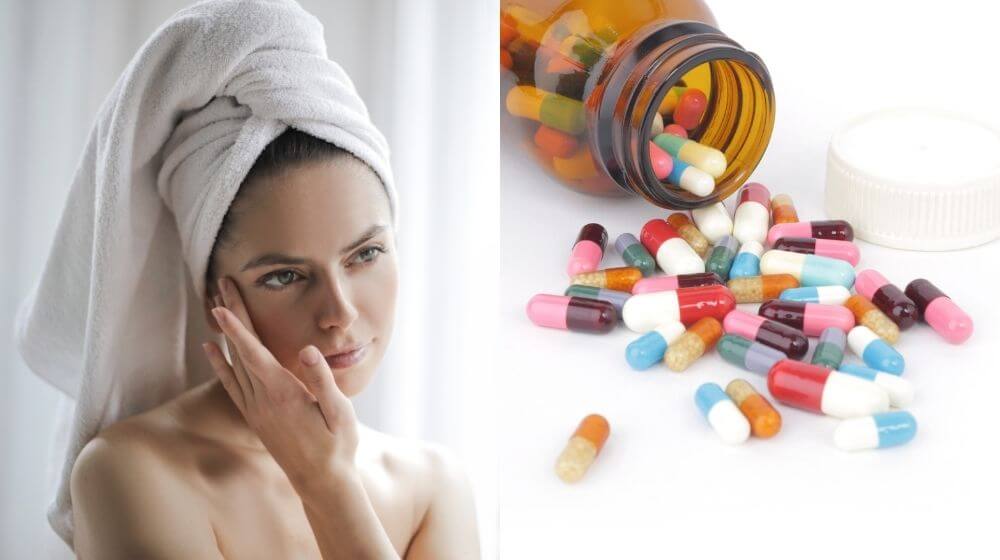Every medication that we take either Allopathic Or Ayurvedic, our body treats as foreign material. According to the mechanism of action of that drug and one’s ability to metabolize that particular drug, the drug shows its desired as well as undesired effects. These undesirable effects are known as adverse effects or side effects. These side effects are seen all over parts of the body, it may be seen on any particular organ, internal tissues, or our skin too. Yes, skin! Skin is the largest organ of our body consisting of various cells, tissues, glands, etc. Due to variability in the anatomy of skin and drugs’ usual mechanism of action, many medications lead to dry skin, acne, urticaria, alterations in skin coloration, photosensitivity like side effects.
Adverse skin drug reactions
1. Dry skin
Conditions like dehydration decreased sebum production, or alteration in lipid layers of skin, make skin dry and itchy.
Following medication due to their desirable mechanism of an action at its site of action shows side effects on the skin.
- Diuretics– Drugs like hydrochlorothiazide, Furosemide are mainly prescribed for lowering blood pressure. This is achieved by exerting out more salt and water from the body. Due to dehydration, this medication makes the skin dry.
- Stains– Drugs like lovastatin, atorvastatin are used for lowering the levels of cholesterol and other lipids from blood. Due to alteration in lipid layers of skin, skin becomes more porous and leads to dry and itchy skin.
- Antihistamines drugs– like diphenhydramine block histamine receptor lead drying of the skin
- Acne medication– Acne medication like Accutane and Retin-A decreases oil production which results in dry and itchy skin. Accutane primarily causes dry lips.
2. Photosensitivity
It is the condition where the skin becomes more sensitive to ultraviolet i.e sunlight and shows symptoms like inflammation, rash, Blistering of skin, stinging, and burning sensation. This is due to two reasons.
- Phototoxic reaction– where the drug may get activated after exposure to sunlight and cause skin damage. Example -rash
- Photoallergic reaction– Upon exposure to sunlight, Some drug’s structure may get altered which leads to activation of the immune system against that drug. Example- eczema.
#List of drugs causing photosensitivity:
- Antibiotics like Doxycycline, Ciprofloxacin are used in various bacterial or other microbial infections.
- Sulfa drugs like sulfamethoxazole- trimethoprim are used to treat a wide range of bacterial infections in-ear, urinary tract, respiratory tract, etc.
- Every person who uses these antibiotics may or may not see photosensitivity. But a person whose skin is sensitive to sunlight and antibiotics should avoid direct exposure to sunlight until antibiotics treatment is going on.
- Antihistaminic- like Cetirizine is used to treat various allergies, colds, cough.
- Malaria drugs- Drugs like chloroquine, hydroxychloroquine are used to treat malaria.
- Cancer chemotherapy drugs- like 5 fluorouracil, Cetuximab used in cancer chemotherapy.
- Antihypertensive drugs- like amiodarone, nifedipine, diltiazem, furosemide used for lowering blood pressure.
- Antidiabetic drugs- like chlorpropamide, Micronase are used to treat diabetes.
- Painkillers-naproxen, piroxicam
It’s important to note that not every person who uses these medicines has a photosensitivity reaction. One who is sensitive to such a reaction should avoid direct exposure to sunlight. Such patients can also use suitable sunscreens.
3. Acne Or Acneiform reactions
Hormonal medications – Due to alteration in the hormonal level in the body acneiform reactions are seen.
Following hormonal medications may worsen the acne-
- Contraceptive pills/injection- Example-Provera Or Depo-Provera
- DHEA supplement- used for anti-aging, improving muscle strength, infertility, depression may also lead to popping up of pimples as it is hormonal preparation.
- Anabolic steroids – like Danazol, stanazolol, Used for building up muscle.
- Corticosteroids- like Prednisolone, dexamethasone, betamethasone may result in popping up of acne.
- Vitamin B12
- Anti-tuberculosis drugs like Isoniazid (INH), Rifampicin used for the treatment of tuberculosis may also lead to worsening of acne
- Anticonvulsant drugs- like Valproic acid, Phenytoin used to treat epilepsy.
- Antipsychotic and antidepressant drugs- like trazodone, haloperidol phenobarbital are used for the treatment of schizophrenia.
- Lithium carbonate an antidepressant medication used in Bipolar disorder may cause acne eruption.
- Halogen compounds- medication consisting of Iodine, Bromine, Fluorine, chlorine as ingredients.
- Thyroid preparation -Drugs like thiouracil, thiourea may lead to acne eruption.
- epidermal growth factor receptor inhibitors— Cetuximab is the most promising drug for epithelial cancer treatment but it has a tendency the of worsening acne.
- Immunosuppressant drugs – like cyclosporine, Azathioprine used in organ transplantation.
4. Eczematous drug eruptions
It is a heterogeneous group of skin reactions that is similar to eczema both clinically and histologically.
Following drug shows this side effect-
- Antiviral drugs which are used to treat hepatitis C
- Cardiovascular drugs- like methyldopa, hydralazine, Captopril used to treat hypertension.
- Interleukin 17 inhibitors.
With this severe adverse effect of medication, patients should immediately consult regarding this to a physician.
5. Hives/ Urticaria
In this condition, the skin surface becomes itchy, raised, and red.
- Antibiotics- like penicillin, Cephalosporine, sulfonamides, tetracycline drugs used to treat bacterial infection.
- Hydralazine is an antihypertensive drug.
- Non-steroidal anti-inflammatory drugs are used as painkillers.
The severity of the urticaria reaction can be variable. After consulting with physicians one can stop usage or start using alternative medicine.
Don’t ignore any of the above adverse effects. Do inform your physician regarding adverse drug skin reactions. The physician may prescribe another medication of similar action, which will give you relief from these adverse effects.

